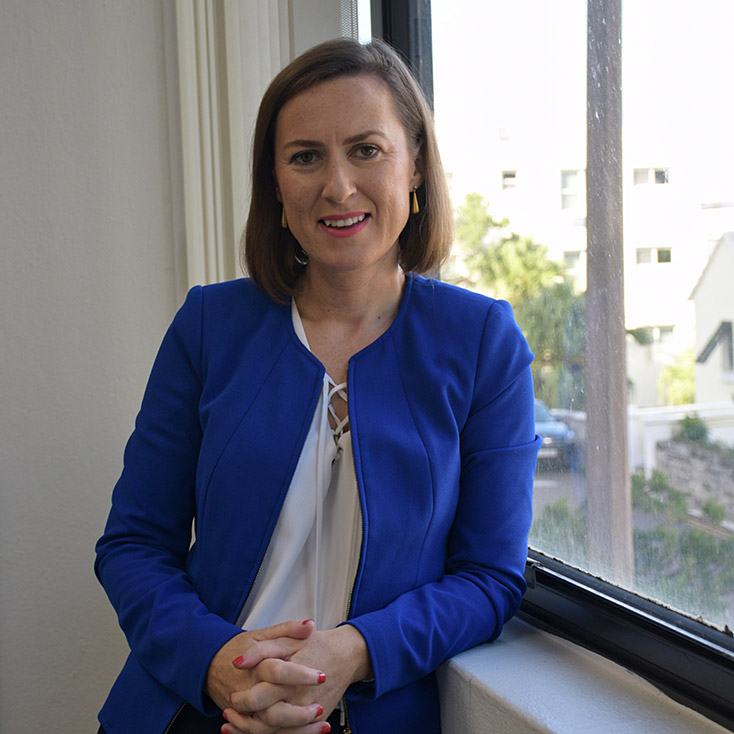The old saying that good staff are hard to come by has rarely been so apt. Retaining and attracting employees is a major concern for companies large and small in a tight labour market. In this roundtable discussion with three prominent recruiters for Bermudian agencies, we gain insight from the frontline of the war for talent.
Speaking with Jonathan Kent were:
 Liz Ebbs-Brewer, manager, recruitment services, Expertise Group
Liz Ebbs-Brewer, manager, recruitment services, Expertise Group
 Shaun Penny, senior recruitment consultant, Acumen Group
Shaun Penny, senior recruitment consultant, Acumen Group
 Sylvia Jones, director — Bermuda, Elevate Executive Selection
Sylvia Jones, director — Bermuda, Elevate Executive Selection
Comments were edited down for brevity.
Navigate: How is the war for talent playing out in Bermuda?
Liz: We’re in an employee-driven market — before Covid, it was more employer-driven. It’s especially competitive in technical roles where designations are required, such as actuaries and accountants. We’ve definitely seen an overall increase in base salaries for technical skill sets. We’ve seen broader implementation of work-from-home options, a critical benefit for many people whose lifestyles have evolved around it.
Sylvia: Many of the startups who got their licences approved 12 to 18 months ago have reached that point where they’re ready to expand their teams and they’re all coming into the market at the same time. Candidates often have multiple conversations on the go at the same time. They’re going to choose a company that’s not only a good fit with a very competitive compensation package, but they’re ready to act now. That makes a huge difference.
Shaun: Covid really dented the market. A lot of professional talent left the island and hasn’t come back. Those roles did not go away —the need is still there. Almost daily I’m having conversations with people who say ‘keep me in mind if anything comes in’. They are seeing that salaries have gone through the roof in the last year. But companies can’t keep throwing out more and more money for salary – it’s not sustainable. Salary offers have gone up 10 to 15 per cent, I would say. Employers are also getting more creative with total comp, for example with housing allowance if the talent is coming from off island. Their need to fill these positions is not six or nine months away, it’s now. Employees who may not be quite ready for a promotion are now getting a chance.
Navigate: Many companies are talking enthusiastically about diversity, equity and inclusion. Are you seeing changes in hiring practices or or talent management that would reflect this?
Sylvia: When it comes to executive search, we’ve not witnessed any changes that take DEI into account. There may be internal protocols, but they’re not necessarily communicated to us. There’s always a traditional desire for Bermudians at the executive level, and that’s always stipulated from the outset. But beyond that to be honest, we really don’t encounter specific instructions in relation to DEI.
Liz: I have seen companies who have implemented processes to minimise bias in the recruitment process. More are using online portals that can hide information that could cause bias, such as names and universities. Also, some have asked us not to provide compensation expectations at the initial phase, as this could cause bias, particularly with gender imbalance. A number of clients ask us to identify a talent pool that reflects the island’s population. During the past six months, a few clients have asked about necessary adjustments to interview processes to accommodate candidates who have different needs so that they can perform to the best of their ability in the interview.
Shaun: I have seen a desire to hire Bermudians or spouses of Bermudians. Outside of that, everybody I’ve worked with says they’re just looking to hire the right person.
Navigate: The major challenge with diversity seems to be at the higher levels.
Shaun: One factor in that may be that about ten years ago, there was a shift that many highly qualified, professional women put their careers on hold to take care of the family. I’m seeing more individuals coming back into the workforce. Without the gap in their profile, they would probably be in a senior role now, but it was a decision that they made for family.
Liz: I agree — I’ve seen a few exactly like that. There is also a glass ceiling issue. At Expertise, we recently presented diversity data to IB CEOs. One finding was a significant underrepresentation of black women beyond middle management despite their significant years of experience and education. This is something that needs to be addressed urgently.
Navigate: The Bermuda Government has expressed its desire to grow the working population by 25 per cent, or 8,400 people, over the next five years. What do you think about this idea?
Shaun: It’s only going to be good for the economy, for employers and for agencies like all of us on this call. I don’t think that number is unreachable, but we will maybe need to build some more houses. Having more people on island would lower costs for everything, because there would be more more availability. I only see it being a plus for for everybody involved.
Sylvia: The working population number is severely inadequate to fund the ongoing and surely increasing costs of running the government. I think the government needs a clear roadmap and to communicate that Bermuda is open and receptive to companies and individuals. The roadmap needs to specify those we want to attract. I see great potential in the private family office sector. These individuals are small in number, but they contribute a huge amount to the economy. Their top four criteria are safety, scenery, a business-friendly timezone, and easy access on and off island. Bermuda exudes all of these. So why not capitalise on it? I think that if we hit the right chord and get them here, the knock-on effects will be will be positive for everybody.
Liz: An increase in the working population will benefit all businesses here. But challenges that we’re seeing for people relocating now would need to be overcome — housing is one, in particular a shortage of rental accommodation for professionals relocating with a family. With regard to work permits, the Department of Immigration does great work — the swift processing time they’ve implemented for qualified actuaries has been positive. But we have also seen challenges for businesses facing long processing delays. That could be challenging if we have more people coming in.
Shaun: Overall, I also think Immigration does a good job, but maybe some more hands on deck would help. Mostly, our permits get done on time, generally within eight to ten weeks. From a housing standpoint, I find there is much more Airbnb available for rent than there is long-term rental property.
Sylvia: I agree about the need for more hands on deck. Work permit delays can push companies to consider: Does the role have to be fulfilled in Bermuda? What about taking it overseas? What about remote working from overseas? It brings all that into play. The housing crunch has really become a challenge from mid-2020 to now.
Navigate: Can you share any examples of the housing shortage’s impact on individuals?
Sylvia: We’ve had two situations where an executive came and rented a one-bedroom apartment and left his family overseas, because they couldn’t find a family home. The hiring company then runs the risk of potentially losing that individual if this remote family life doesn’t work out for them. We used to be able to show our relocation clients ten or 12 homes, five or more years ago. It’s not a tenable situation if you’re asking someone to take a job, but you only have two houses to choose from. There are many homes tied up in family trust scenarios that have been allowed to fall into dilapidation and if those could be somehow renovated and reinserted into the inventory, it would help. The real needs in Bermuda now are for three- and four-bedroom executive homes and for two-bedroom city living and for these projects to be started today. I’ve said to potential property developers, we will pre-fill the properties for you, but you have to start construction now — it’s really urgent.
Shaun: Bermuda is often compared with Cayman. If I take a drive in Cayman, I’m seeing ten different developments and they’re all saying 80-90 per cent sold. I know Bermuda has less land, but I don’t see any such developments here. There’s a lack of homes now — if you want to grow the working population by 8,000, where are they going to live? If you want to be a leader in attracting talent, other things matter too. In Cayman, you can own a property at the end of the day you walk on island and become a citizen in eight or nine years. Maybe there need to be programmes for families with dilapidated homes to renovate and get that rental return. The need for housing is not going away.
Navigate: Is the rise of remote working having any impact on the Bermuda jobs market?
Liz: The cost of living and of doing business in Bermuda is just ever increasing, so many companies are reviewing which roles need to be based here. The argument for outsourcing has become especially pertinent for roles where the individual is working from home successfully. If you don’t need to be in the office here, you can be doing this role from a lower-cost jurisdiction. This trend of outsourcing back-office jobs is not new. It’s been happening slowly over the past eight to 10 years and, given the current economic climate, it’s probably going to accelerate.
Navigate: Are any candidates asking to work remotely from the country where they are located?
Sylvia: Yes, we’ve had candidates looking to work from Canada, the British Virgin Islands and California for companies based in Bermuda. They were very upfront about it and fully expected to find a role. Two did and one is still looking. This is quite a recent trend. With regard to senior roles, they’re mandated by the BMA to be located in Bermuda, so that takes the remote option out of the equation. I agree, this trend has been going on for several years. Companies have changed their business models to operate this way, so we shouldn’t be trying to bring those jobs back, we should be looking at attracting new industries and more companies.
Shaun: More candidates now are talking about working from home two or three days a week, for example. Companies have adjusted and are more flexible on where the work is done. But growing companies still want their people to still be in the office. They want the energy and synergy of everybody working together. Certainly, however, remote work is not going away.

